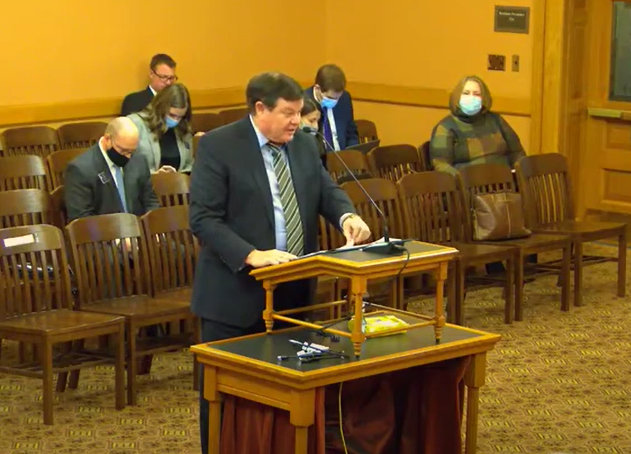
Muscotah resident Jay Armstrong, representing the Atchison County Farm Bureau, voiced support for Senate bill 87, which would revise countywide retailers's sale tax distributions, during a February 11, 2021 Senate hearing in Topeka.
(KAIR)--A Kansas Senate bill, regarding the distribution of sales tax between counties and incorporated cities within, brought Atchison-area representation to Topeka last week, with the majority of those voices, along with others from elsewhere in the state, speaking to the Senate Assessment and Taxation Committee in opposition to the bill.
The proposed legislation is of key interest to the Atchison area due to an ongoing dispute on distribution of funds from a voter-approved 1 cent countywide retailers' sales tax approved by voters in 1993, with the tax approved to fund solid waste and joint communications.
The tax has, for years, been controversial, with the City of Atchison receiving 48.6% of the revenue, while Atchison County receives 47.3%. The City of Effingham receives 2.3%, Lancaster receives 1%, Muscotah receives 0.6%, and Huron, 0.3%.
That’s due to a formula, under state law, regarding the distribution of the funds, with half of the generated revenue distributed according to the mill levy, while the other half is distributed based upon population.
Senate Bill 87 would change that, with a county allowed to keep all of the revenue generated through such a tax, with cities to not receive any funds unless an agreement is reached between the county and the city.
Muscotah resident Jay Armstrong, speaking on behalf of the Atchison County Farm Bureau, was the lone voice speaking in favor of the change during the February 11 Senate hearing. "As I understand it, the law says a city can have up to 1-cent city sales tax, the counties can have up to 1-cent county sales tax, but the county will never get their one-percent, unless they cut a deal with a city, because the state will not distribute the money back directly to the county that is the county's tax, that their voters voted on,” Armstrong said during his presentation.
Mike Stec, Utilities Manager for the City of Atchison, is both a resident and business owner in the County, and was among those opposed to the proposed change. "In 2018, I was appointed by the City of Atchison [to a] task force to come to an agreement on how we move forward [with remedying the sales tax matter]. I will say, I served on that with Mr. Armstrong. He didn't like the work product of that meeting, and I think that's why we're here, so, if anything, I do want to apologize to the Senators for the time that this has taken away from you, because this very much is a local Atchison issue."
On Tuesday, the matter was addressed at the local level, with the Atchison County Commission considering a resolution of support for the bill during their regular weekly meeting.
Commissioners Jack Bower, of the County’s First District, and Eric Noll, of the Second District, voted in support of the legislation, with that support approved through the 2-1 vote.
Third District County Commissioner Casey Quinn cast the lone no vote. “I would just like to say that I oppose that,” Quinn said, prior to casting her vote. “I hope to continue working on an interlocal agreement as I have. There's been really great conversation interlocally, and I don't feel like this is a state issue, that we should be able to work it out here in Atchison County, which I'm very hopeful for."
Quinn explained that Mayors from Huron, Lancaster, and Atchison, were to meet Tuesday afternoon, with Quinn planning to meet with the Mayor of Effingham later in the week, with the discussion to focus on moving forward with an interlocal agreement, in lieu of state intervention.
© Many Signals Communications
MOST VIEWED STORIES
Holton man killed in Jackson Co crash
Morrill pair arrested on drug, child endangerment charges
Falls City man sentenced to Federal Prison
Ground Broken for new Sac and Fox Trad'n Post
Jackson Co traffic stop leads to arrest
Local residents avoid injury in chain reaction crash
90 mph+ downburst winds blamed for Thursday damage
One held for past Atchison shooting
Inmate dies at Lansing Correctional Facility
Wamego man sentenced in second fentanyl-related death
Early Thursday storms leave damage, outages, locally
Stolen trailer, 4-wheeler, recovered in Atchison
Mayetta pair arrested on meth, child endangerment charges
Mound City Mayor Duane Nauman remembered
Horton City Clerk's resignation accepted Monday
Brown Co Planning Commission established
KS' LaTurner will not seek another term
LATEST STORIES
Horton City Clerk's resignation accepted Monday
Atchison Co's Oswald named honorary bailiff for KS Court
Juveniles face charges following Atchison break-in
Richardson County accepted into managed call handling program
No injuries in early Sunday morning house fire in Falls City
Sabetha annual citywide cleanup Wednesday
Mayetta pair arrested on meth, child endangerment charges
Local residents avoid injury in chain reaction crash


 Printer Friendly
Printer Friendly
 Email to a Friend
Email to a Friend




